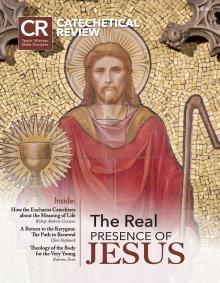We never know which Holy Communion might be our last. We make a big deal of our First Communion, and rightly so. But why don’t we have a strong catechesis and spirituality of Viaticum, that final time we receive the Body of Christ before our soul leaves our own body to meet him?
As a Church, perhaps we are missing a robust eucharistic spirituality in general. Maybe we lack a proper sober focus on our preparation for death. We could likely all benefit from considering the Last Rites in a more personal and specific way, so that they may be more fruitfully celebrated for us and those we love.
For the Dying
“Father, you got here just in time,” the nurse says. It is such a blessed and needed relief when someone receives their final sacraments! No matter the circumstances, these gifts of Holy Mother Church provide occasions of intense grace, whether the person was a daily communicant or long fallen away, whether in an emergency situation or with the comfort of hospice care. Often people will seem to cling to life, whether consciously or not, and then decline rapidly after a priest’s visit. In my experience, this is particularly true if Confession was needed. Care should always be taken to arrange a private moment for that purpose to be properly disposed in the state of grace before the reception of the Eucharist.
Too often, the effects of medicine and the progression of illness limit the scope of the recipient’s participation. Especially with privacy law restrictions ever increasing, the faithful should be reminded to notify the parish with members’ serious health updates so they can be taken care of promptly. Our spiritual family has special solidarity with the suffering.
The texts of the ritual are of incomparable theological, poetic, and pastoral value. The Commendation of the Dying stands out among them with its litanies. Only in the most dire situations should these prayers be omitted. There is a unique form for the administration of Viaticum: “May the Lord Jesus Christ protect you and lead you to eternal life.” All this serves to heighten the gravity of this liturgical and human reality.
Receiving the Anointing of the Sick and Apostolic Pardon together with Viaticum is a sign of divine election. That monumental last blessing has sadly become a forgotten treasure of our spiritual patrimony. What certain peace a soul feels to experience the full force of the Church’s forgiving authority with a plenary indulgence to remit all temporal punishment due to sin in Purgatory, just when it is needed the most! The text is worth quoting in full: “Through the holy mysteries of our redemption may almighty God release you from all punishments in this life and in the life to come. May He open to you the gates of paradise and welcome you to everlasting joy. By the authority which the Apostolic See has given me, I grant you a full pardon and the remission of all your sins in the name of the Father, and of the Son, and of the Holy Spirit.”
The rest of this online article is available for current Guild members.
This article is from The Catechetical Review (Online Edition ISSN 2379-6324) and may be copied for catechetical purposes only. It may not be reprinted in another published work without the permission of The Catechetical Review by contacting [email protected]

















